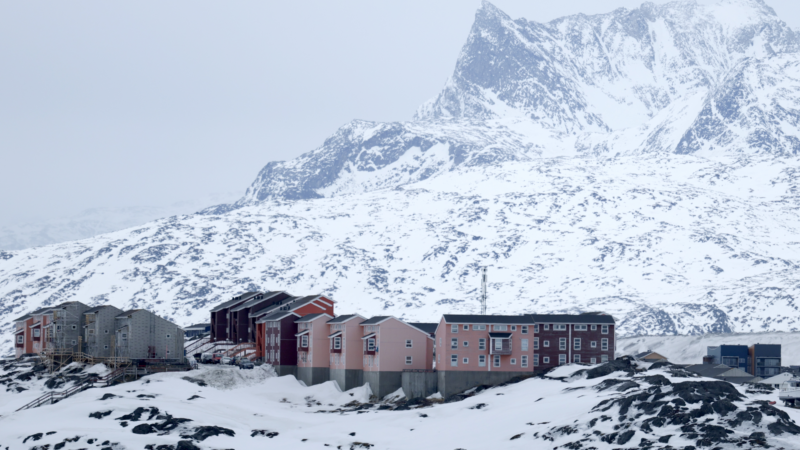What Greenland’s elections mean for the island — and the U.S.
Greenland will soon have a new government led by a pro-independence party — signaling what could be an eventual split from Denmark. Is that a win for President Trump, who has repeatedly said he wants to annex the island?
After all, voters rejected Greenland’s current Prime Minister Múte Egede, whose Inuit Ataqatigiit party came in third in Tuesday’s polls. Egede has insisted that Greenland is not for sale and he framed the polling partly as a referendum on Trump’s seemingly bellicose bullying, saying the election was a “fateful choice.”
But observers say the victory for Greenland’s center-right Demokraatit (Democracy) party, which won the largest portion of parliamentary seats, with 30% of the vote, guarantees neither a quick move toward independence nor closer ties with the U.S.
For starters, the Demokraatit party has also been highly critical of Trump’s rhetoric, insisting that their island — the world’s largest — has the right to self-determination. The party’s leader and Greenland’s likely next prime minister, Jens-Frederik Nielsen, has called Trump “a threat to our political independence.”
The Demokraatit party also favors a go-slow approach to independence, with a gradual strengthening of the island’s economy, which is heavily reliant on fishing exports and direct subsidies from Denmark, before going it alone.
Meanwhile, Naleraq — another center-right party — wants to fast-track independence. It has in the past been more receptive to the U.S. president’s message and came in second in the balloting. But it’s not yet clear if it will be invited to join the new government or be bypassed for a coalition between the Demokraatit party and smaller parties.
Greenland’s strategic importance is growing, especially as a warming climate may open up new Arctic shipping routes in the coming decades. Just 950 miles from the North Pole, the U.S. operates Pituffik Space Base there, a key facility for missile defenses monitoring. Additionally, as Trump has often pointed out, Greenland is thought to be rich in rare earth minerals.
The U.S. wants access to Greenland’s resources to help break the U.S. dependency on China, which has a near-monopoly on some critical elements used in the technology and defense industries. But mining in Greenland is challenging, with a lack of infrastructure, harsh climate and pushback from local communities.
Almost no one in Greenland wants to be part of the U.S.
An opinion poll published in January showed that an overwhelming number of Greenlanders favor independence. The survey showed that 84% wanted independence from Denmark, while 45% said they only want it if it doesn’t hurt their standard of living. Only 9% said they didn’t want full independence from Denmark and just 6% were in favor of becoming a U.S. state.
A key message from Tuesday’s vote is directed at Trump, according to Ulrik Pram Gad, a senior researcher at the Danish Institute for Strategic Studies: “If [he] had any idea that his invitations and threats … would be welcomed … he’s done himself a disservice.” Instead, Gad says, the results indicate that Greenlanders “are pushed away and more reluctant to engage with the U.S.”
Mark Nutall, a professor at the University of Alberta’s Greenland Climate Research Centre, agrees, saying that “you could argue that the recent election results indicate a firm rejection of U.S. territorial ambitions.”
As for independence, it’s “going to be a little bit more of a cautious approach,” he says. “Many in Greenland think, ‘Well, we would like to be independent, but we need to secure a very strong foundation, particularly the economic foundation.’ “
That sentiment is echoed by Hans Jensen, a mining executive who is Danish but has worked in Greenland for decades.
“Independence is not going to happen any time soon,” he says.
But, Jensen adds: “Greenlanders are not interested in becoming a U.S. state. That is what the election showed — by making the Democrats the largest party.”
Bread-and-butter issues predominated over international politics
Despite the international attention paid recently to Greenland and all the talk of independence, most of the country’s 56,000 people are focused on the sort of bread-and-butter issues that are foremost in voters’ minds anywhere in the world, according to Jeppe Strandsbjerg, an associate professor at the Royal Danish Defence College.
“A lot of people [want to have] improvements in the schooling system, improvements in the health care system,” he says. Those issues are “more present in the electorate than the issues that we usually focus on from the U.S.”
Arson engulfs Mississippi synagogue, a congregation once bombed by Ku Klux Klan
A suspect is charged with arson in a fire that burned through a synagogue in Mississippi. Flames and smoke destroyed its library, housing Torahs.
DOJ subpoenas Federal Reserve in escalating pressure campaign
The Justice Department has subpoenaed the Fed over chair Jerome Powell's testimony over the central bank's headquarters renovation. Powell calls it part of a pressure campaign over interest rates.
The 2026 Golden Globe awards are Sunday. Here’s how to watch
The 2026 Golden Globes air on Sunday night starting at 8 p.m. ET / 5 p.m. PT.
National Portrait Gallery removes impeachment references next to Trump photo
A new portrait of President Trump is on display at the National Portrait Gallery's "America's Presidents" exhibition. Text accompanying the portrait removes references to Trump's impeachments.
America’s top figure skaters dazzled St. Louis. I left with a new love for the sport.
The U.S. Figure Skating National Championships brought the who's who of the sport to St. Louis. St. Louis Public Radio Visuals Editor Brian Munoz left a new fan of the Olympic sport.
DHS restricts congressional visits to ICE facilities in Minneapolis with new policy
A memo from Homeland Security Secretary Kristi Noem, obtained by NPR, instructs her staff that visits should be requested at least seven days in advance.







